Shaking the Stigma - How Mental Health is Gaining a New Reputation in India
Written by: Dr Megha Dhillon, PhD
“I woke up feeling directionless, I didn't know where to go, I didn't know what to do and I had these bouts of feeling so low that I would just start crying at the drop of the hat.”
- Actress Deepika Padukone in an interview with NDTV
Like many other parts of the world, mental health and illness have been taboo topics in India. Psychiatric disorders, including eating disorders and depression, are poorly understood and shrouded in myth. More often than not, mental health problems are attributed to past sins and bad karma. Symptoms of mental illness are dismissed as a ‘phase’ or a ‘sign of weakness’. The idea of seeing a psychologist or a psychiatrist is practically out of the question for most people. In the less developed parts of the country, mental illness is still attributed to evil spirits and treatment is sought from ‘medicine men’ and quacks. People with mental health problems are often hidden away by their families out of a sense of shame and fear of ostracism.
Indian movies and television have fed into these misconceptions and stigma around mental health through inaccurate and exaggerated portrayals. People with mental illness have been repeatedly represented in comical ways or as dangerous and threatening.
While this paints a bleak picture, there are some noticeable signs of change occurring in India. Mental health concerns are garnering more public attention and some people have begun to address the issue more openly. This article discusses some of the factors that are contributing to this change.
Mental Health in India
Although several misconceptions about the nature and causes of mental illness still remain, there is now a greater acknowledgement of the fact that millions of people in India are suffering from anxiety, eating, depression and substance abuse disorders. Data collected on mental health in India by the government and international bodies such as the World Health Organisation have been published frequently in leading Indian newspapers. India’s outcomes on the World Happiness Survey indicate that it is one of the unhappier countries in the world (ranked 136 out of 142 countries in 2022), with this knowledge widely circulated among Indian communities.
There have been reports of many people with eating disorders, of which body dissatisfaction is a key risk factor, living in distress due to a lack of awareness about these conditions. An article titled “Suffering in silence: Eating disorders go unnoticed in India” written by Susanti Sarkar in 2021, discusses the negligent attitude towards these problems in India. There is very little information on the number of people experiencing eating disorders, the severity of the symptoms and the causal factors contributing to eating pathology in the country. Newspaper reports such as these are acting as catalysts to challenge the silence that currently engulfs eating disorders.
A Top-Down Approach to Dismantling Mental Health Stigma in India
Change in Policy…
After much advocacy and waiting, India saw the passing of the new Mental Healthcare Bill in 2016. The bill provides a more nuanced understanding of mental illness and emphasizes each person’s right to access mental healthcare. On paper, the bill:
Protects citizens from inhumane and degrading treatment and the right to information about their illness.
Requires the government to meet internationally accepted norms for the number of mental health professionals within 10 years of the law passing.
Decriminalises suicide attempts, which so far could have resulted in jail time.
Traditionally, India has suffered from a persistent gap between policy development and policy implementation. Therefore, how the Mental Health Act is put to use in hospitals, clinics, community centres and homes across the country needs to be observed closely.
Change in Access and Awareness…
Along with government initiatives, the number of nonprofits addressing mental health is growing. These organisations work with urban and rural communities, including those who have been traditionally marginalised to increase awareness around mental health. Organisations include…
The Banyan located in the Southern Indian state of Tamil Nadu works with persons with mental illness and women who are homeless.
The MINDS Foundation located in Mumbai, Vadodara, Bhavnagar, and Nizamabad works to eliminate the stigma around mental health/illness through education, training and increased access to care based services.
Sangath in Goa is committed to addressing the psychological and social needs of people by empowering existing community resources.
Many existing awareness programs target urban communities. Awareness of mental health remains poor in smaller towns and rural areas. Advocacy and awareness efforts must reach rural areas, where avenues of treatment are far and few, if any at all. And finally we need a much larger work force of psychiatrists, psychologists and social workers to reach a nation of over a billion people.
Change in Representation…
Television and film are influential mechanisms for diversifying the representation of mental health, especially in India. Equally, celebrities can be catalysts for change. With regards to television and film, the film Dear Zindagi (Dear Life) was released in 2016 and provided a different perspective of mental health in India. This Hindi film centers around a young cinematographer who is discontented with her life and meets a free-spirited psychologist who helps her to gain a new perspective on things. The film depicts the therapeutic process in a positive light and shows the role it can play in enabling people to work through their emotional issues.
With regards to celebrities, popular actress Deepika Padukone was one of the first celebrities to acknowledge her experience of living with depression. Deepika was diagnosed with depression in 2014. After grappling with feelings of “emptiness’ and purposelessness, she finally sought professional help and recovered from her symptoms. Deepika went on to create the Live Love Laugh Foundation in 2015, to bring awareness to mental health in India.
Other actresses have spoken of their struggles with body image, weight and the constant pressure to live up to appearance ideals. Tired of such pressures, actresses have taken the initiative to declare their ‘imperfections’ in the public domain. They have also spoken against media-presented ideals with respect to skin colour and body shape. Actress Yami Gautam garnered attention for a social media post about her skin condition Keratosis Pilaris which causes dry, rough patches and tiny bumps. She said that being candid about her skin condition was “liberating” and how she had always been urged to airbrush her pictures for this reason. Ironically, she is the brand ambassador of a fairness cream.
3 Things Industry Can Do To Help Dismantle Mental Health Stigma in India
1. Consider the mental health culture of your business or organisation. Is mental health normalised and prioritised, or is it taboo and neglected? If the latter, explore ways to increase a safer and more supportive environment for mental health. This might include:
a. Normalising conversations around mental health and wellness
b. Providing employees with mental health training opportunities
c. Inviting feedback from employees about the mental health culture at your business or organisation
d. Publicly announce your commitment to your employees mental health
2. Sponsor or donate to an Indian mental health nonprofit. These organisations are often underfunded and require additional financial support to support the community.
3. Fund high quality research on mental health in India. For example, a small but emerging volume of industry funded research has allowed academics to work with young people in India. This research shows that the young people of India grapple with body dissatisfaction, and that there are very few evidence-based interventions that support young people with these issues. This industry funded research has resulted in the development of new body image interventions for both urban and rural settings!
Conclusion
India seems to be moving towards a greater acceptance of mental health. Open dialogues around people’s experiences with mental health issues including anxiety, depression, eating disorders, substance use and how they overcome their struggles may be the best way to generate macro-level changes. Support from the media and sustained efforts by the government, companies and brands, nonprofits and mental health professionals are essential in addressing existing gaps.
Topic Summary:
This article focuses on India’s gradually increasing engagement with mental health issues and recent initiatives by the government, non-profit organizations, mental health professionals and celebrities to challenge the silence and stigma around mental illness and its treatment in the country.
Keywords:
India, mental health, stigma, body image, social media
Meet Megha
Living in New Delhi, Dr Megha Dhillon is a Professor of Psychology at Lady Shri Ram College, Delhi University. Her visionary perspective and track record has earned her the reputation of being the leading body image and mental health expert in India.
She is passionate about upskilling young people with mental health literacy, and challenging gender and social norms that perpetuate limiting stereotypes. She is also known for her ability to translate and adapt evidence-based techniques across cultures.





